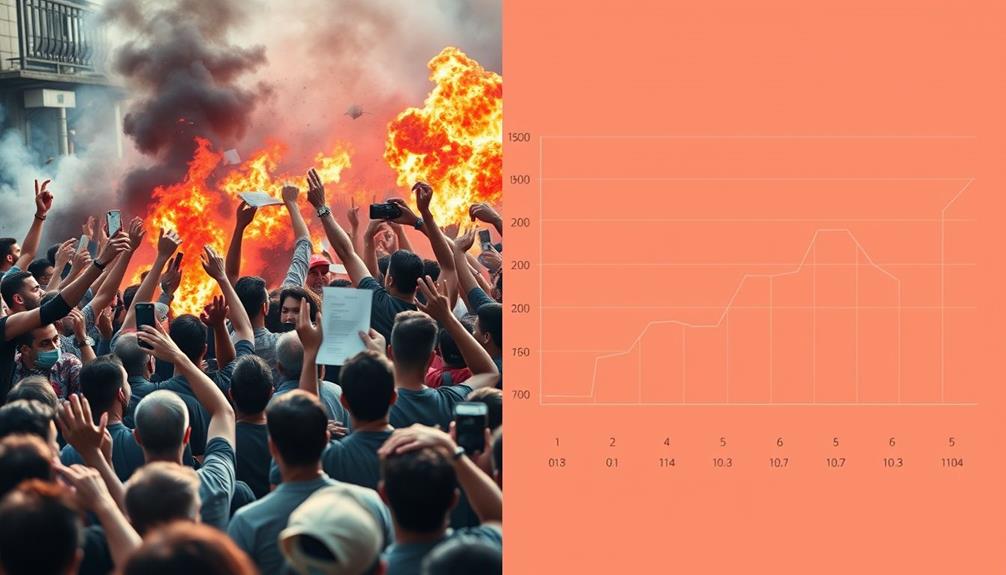Daniel Kahneman's quotes shed light on the nuances of decision-making in behavioral economics. He emphasizes how your perception and cognitive biases can distort your judgments. Kahneman warns that overconfidence may lead you to underestimate risks, while anecdotes can misrepresent broader statistical truths. Understanding your knowledge limits promotes intellectual humility and better choices. He also highlights the pitfalls of overly optimistic predictions, urging caution instead. By grasping these insights, you can refine your decision-making skills. Stay tuned to uncover how these principles can empower your everyday choices.
Key Takeaways
- Kahneman emphasizes how cognitive biases distort our decision-making, illustrating the need for awareness to improve judgment quality.
- His insights highlight the importance of emotional stability, which enhances clarity in decision-making processes.
- Kahneman underscores the limitations of human predictive abilities, warning against overconfidence in forecasting future events.
- He advocates for intellectual humility, encouraging individuals to recognize their knowledge limits to foster better decision-making.
- Kahneman points out the pitfalls of anecdotal evidence, stressing the necessity of statistical literacy to avoid misguided conclusions.
The Importance of Perception
Perception plays an essential role in how you navigate decision-making in your daily life. As a psychologist, Daniel Kahneman emphasizes that "Nothing is as important as we think it's while we're thinking about it." This highlights the subjective nature of importance in your decision-making processes.
Your perception can lead you to overestimate current concerns, impacting how you prioritize tasks in both personal and professional contexts. Additionally, stress management techniques can enhance your emotional stability, allowing for clearer judgment during decision-making.
Kahneman's insights reveal that your emotional state greatly influences your perception of what matters, often skewing your judgments and resulting in misinformed decisions. This means that when you feel stressed or anxious, you might give undue weight to negative events, which can distort your understanding of reality.
Such cognitive biases can further affect your overall decision quality.
Confidence and Decision-Making

Confidence often plays a pivotal role in how you make decisions, shaping your beliefs and influencing your actions. However, high confidence isn't always synonymous with accuracy. Daniel Kahneman points out that when you feel overly confident, it often reflects a compelling narrative rather than solid evidence, which can lead to misjudgments in decision-making.
Understanding your SEO strategies can help in recognizing how biases affect your evaluations, as the pressure to conform to popular opinions may further cloud your judgment.
Overconfidence can distort your perception of your capabilities, making you underestimate the risks involved. This tendency is prevalent across various fields, affecting both personal choices and organizational strategies.
When you mistake certainty for truth, you may skew your evaluations of expert opinions and forecasts, often leading to costly consequences.
To combat these pitfalls, it's essential to develop awareness of your cognitive biases. Questioning your high confidence claims can enhance your decision-making process, enabling you to make more rational evaluations of risks.
By acknowledging that overconfidence can lead to errors, you empower yourself to approach decisions with a more balanced perspective—ultimately improving your outcomes.
Nature of Predictions

Often, people overestimate their ability to predict future events, which can lead to misguided decisions. Daniel Kahneman emphasizes that our tendency to rationalize past events inflates our confidence in making accurate predictions. This behavior stems from a psychological mechanism where we believe we grasp the past well enough to foresee the future.
However, the unpredictability of the future is a fundamental reality we often ignore, much like the challenges faced in AI's potential raises significant privacy issues that can complicate decision-making.
Kahneman warns against the allure of extreme predictions, which usually arise from self-indulgence rather than grounded assessments. When you fall prey to confirmation bias, you tend to favor information that aligns with your existing beliefs, further complicating your ability to forecast accurately. This bias can cloud your judgment, leading you to make decisions based on selective evidence rather than a thorough view.
Recognizing the limitations of your predictive capabilities is essential. A more cautious approach to decision-making can help you navigate the uncertain terrain of future events.
Understanding the Future

Understanding the future requires acknowledging the limitations of our predictions. Kahneman's quotes remind us that our understanding of human decision-making is often clouded by cognitive biases. We tend to rationalize past events, which gives us a false sense of predictability and overconfidence in forecasting. This illusion of understanding makes it tough to accept that the future is inherently unpredictable.
In relationships, for instance, the way we interpret past interactions can shape our expectations and decisions, often leading to misunderstandings or unrealistic anticipations reviving old friendships.
Consider these points:
- Our experiences shape our beliefs about future outcomes.
- Cognitive biases can lead to overly optimistic or extreme predictions.
- The ease of explaining past events may mislead us into thinking we can predict the future.
- A critical evaluation of past events enhances informed decision-making.
- Embracing humility in the face of uncertainty fosters better judgment.
Kahneman's work illustrates that the unpredictability of the future is undermined every time we cling to past experiences for guidance. By adopting a cautious and reflective approach, you can navigate future uncertainties more effectively and make decisions that account for the unpredictable nature of life.
Awareness of Ignorance

You mightn't realize just how much you don't know, and this ignorance can skew your confidence in your decisions. Small mistakes often overlooked, such as miscommunication and poor planning, can compound this issue and lead to significant consequences.
Recognizing the limits of your knowledge is essential for developing intellectual humility, which opens the door to continuous learning and questioning. By embracing this awareness, you can enhance your decision-making skills and navigate life's uncertainties more effectively, ultimately fostering personal and professional growth through mindfulness and thorough review.
Limitations of Human Knowledge
The limitations of human knowledge reveal a striking truth: many people remain unaware of their own ignorance. This "blindness to our blindness" often leads you to overestimate your understanding and confidence in your beliefs.
Kahneman highlights how you might construct narratives that feel coherent but lack a solid foundation in evidence, distorting your perception of reality. Just as individuals may struggle to recognize their own narcissistic traits, understanding narcissism can provide essential insights into our behaviors and decision-making processes.
Recognizing the following aspects can help you navigate these limitations:
- Overconfidence can skew your judgment.
- Cognitive biases cloud your decision-making.
- Past beliefs are often reconstructed inaccurately.
- You may not realize how little you know.
- Intellectual humility encourages continuous learning.
Importance of Intellectual Humility
Intellectual humility serves as an essential antidote to the overconfidence that often clouds judgment. Daniel Kahneman, a Nobel Prize winner, emphasized our tendency to be "blind to our blindness," illustrating how we often overestimate our understanding. By recognizing the limitations of our knowledge, you can cultivate intellectual humility, which is fundamental for effective decision-making. This is particularly important in the context of caregiver support networks, where understanding emotional and practical needs enhances our ability to assist others.
When you acknowledge your ignorance, you open yourself up to new information and perspectives. This awareness helps mitigate cognitive biases that can distort your thinking. Overconfidence, for instance, often arises from a coherent narrative rather than objective evidence. By questioning your assumptions and remaining curious, you can improve your critical thinking skills and make more informed choices in both personal and professional contexts.
Kahneman's insights underscore the importance of developing intellectual humility. By doing so, you foster an environment where continuous learning thrives, ultimately leading to better outcomes.
As you embrace this mindset, you'll find yourself more adaptable and better equipped to navigate the complexities of life, making decisions that reflect a deeper understanding of the world around you.
Continuous Learning and Questioning
Recognizing the limits of your knowledge is essential for fostering continuous learning and questioning. Daniel Kahneman's insights remind us that acknowledging our ignorance can greatly enhance decision-making.
When you embrace intellectual humility, you open yourself to new information and diverse perspectives, which can help you navigate cognitive biases. This principle of openness can also apply to various areas of life, such as exploring natural alternatives for wellness, like essential oils for relaxation, which can improve emotional balance and mental clarity.
To promote a mindset of continuous learning and questioning, consider these key points:
- Stay curious: Ask questions and seek out new knowledge.
- Embrace uncertainty: Accept that you won't have all the answers.
- Challenge assumptions: Regularly evaluate your beliefs and narratives.
- Learn from others: Be open to insights and experiences from different viewpoints.
- Reflect on decisions: Analyze past choices to understand how biases may have influenced them.
Anecdotes Vs. Statistics

You might find yourself swayed by a compelling personal story, even when it contradicts the statistical data. This cognitive bias can cloud your judgment and lead to poor decisions, especially in critical areas like health and finance.
For instance, when considering dietary choices, key strategies for a healthy lifestyle emphasize the importance of balanced nutrition and informed decision-making.
Understanding the importance of statistical literacy can empower you to recognize these pitfalls and make more informed choices.
Cognitive Bias in Decisions
In decision-making, the allure of personal anecdotes often outweighs the cold hard facts of statistics. This preference for anecdotal evidence can create significant cognitive biases that distort your judgment. When you hear a powerful story, it's easier to relate to it than to process abstract data.
Kahneman emphasizes that this tendency can lead to poor choices, especially in critical areas like investment and healthcare. This phenomenon isn't unlike how astrological signs influence personality traits linked to attractiveness, where personal beliefs can shape perception more than empirical evidence.
Consider these points about the impact of cognitive bias on your decisions:
- Anecdotes are emotionally resonant and memorable.
- Personal stories can overshadow statistically significant findings.
- Vivid examples distort perceptions of risk and probability.
- The brain seeks narrative coherence, often ignoring broader data trends.
- Relying on anecdotes reinforces biases like the availability heuristic.
Importance of Statistical Literacy
While anecdotes can be powerful in shaping our perceptions, understanding the importance of statistical literacy is essential for making informed decisions. When you rely on anecdotal evidence rather than statistical data, you risk falling prey to cognitive biases that distort your judgment.
Kahneman points out that people often cling to individual stories, overlooking broader statistical trends that provide a clearer picture of reality. A study by the National Center for Education Statistics reveals that only 34% of U.S. adults are proficient in statistical reasoning, underscoring the need for improved education in this area.
Anecdotes may feel more relatable and memorable, but they can create a false sense of risk and probability. This tendency is amplified by the availability heuristic, which leads you to overestimate the significance of recent or vivid experiences while ignoring more thorough data.
Anecdotal Evidence Pitfalls
Although anecdotes can stir emotions and create memorable narratives, they often lead to misguided conclusions when compared to statistical evidence. You might find yourself swayed by a compelling story, but this can obscure the statistical realities that inform better decision-making.
Cognitive biases, such as the availability heuristic, make vivid examples seem more relevant, pushing aside the need for statistical literacy.
Consider these pitfalls of relying on anecdotal evidence:
- It lacks the statistical rigor needed to represent broader trends.
- Personal stories can mislead you about actual probabilities and risks.
- Anecdotes often amplify overconfidence in your observations.
- They can distract from critical information essential for informed choices.
- Isolated incidents don't account for the bigger picture.
Understanding the distinction between anecdotal evidence and solid statistics is essential. By cultivating statistical literacy, you can enhance your critical thinking and improve your decision-making.
Don't let emotional narratives overshadow the larger empirical evidence; instead, rely on data to guide your choices more effectively.
Frequently Asked Questions
What Was Daniel Kahneman's Famous Quote?
Daniel Kahneman's most famous quote emphasizes how our perceptions can distort what we prioritize. He suggests that nothing in life is as important as it seems when you're deeply thinking about it. Reflect on that.
What Are the Behavioral Biases of Kahneman?
Imagine standing at a crossroads, where biases cloud your judgment: loss aversion grips you in fear, anchoring distorts your choices, overconfidence deceives your vision, and framing twists reality. Kahneman's insights reveal these powerful influences on decision-making.
What Are the Theories of Daniel Kahneman?
Kahneman's theories include Prospect Theory, which explains loss aversion, and the distinction between System 1 and System 2 thinking. These concepts reveal how your decisions are influenced by cognitive biases and emotional responses.
What Is the Quote on Loss Aversion?
You might feel like losing $100 is the end of the world, right? Kahneman famously said, "Losses loom larger than gains," emphasizing how our fear of losing shapes decisions, often leading to overly cautious behavior.
Conclusion
In the landscape of decision-making, Kahneman's insights serve as a compass, guiding you through the fog of uncertainty. By recognizing the power of perception and the limits of your predictions, you can navigate life's complex choices with greater clarity. Remember, while anecdotes can color your understanding, statistics provide the sturdy foundation you need. Embracing your own ignorance can be liberating, allowing you to approach the future with curiosity and resilience, ready to explore the unknown.









